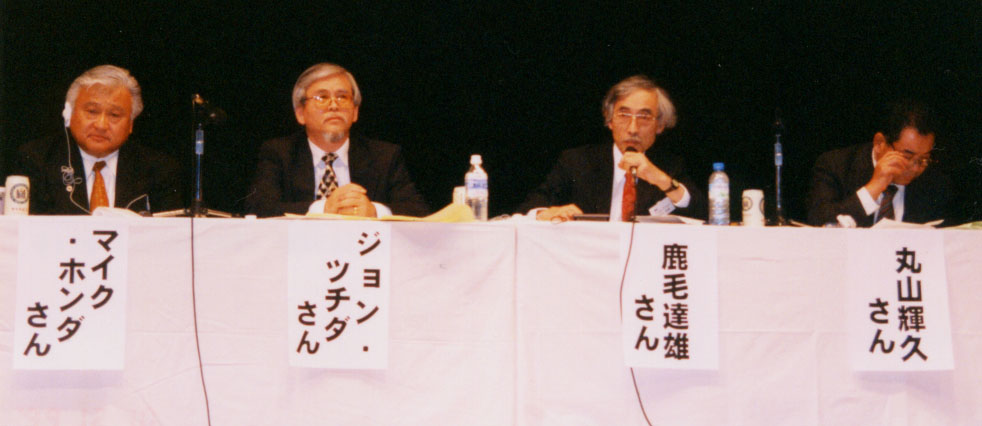
International Citizens' Forum on War Crimes &
Redress --
The
second day of the ICF,
December 11th, started out with five workshops reviewing testimonies
and reports by victims, lawyers and supporters in the morning:
·
Nanjing Massacre
·
Military Sexual Slavery & Sexual Violence against Women
·
Forced Labors / POW
·
Unit 731 / Germ & Chemical Warfare
·
Military Payment Certificate & Looted Cultural Properties
In
the workshop on looted cultural properties, Professor Zhao Jianmin reported that
his research showed that Japan had looted more than 2.7 million books during its
invasion of China. After the war Japan only returned 158,873 of them. On
the same panel Japanese Attorney Masatoshi Uchida commented that although the
responsibility of Japan to honor the military payment certificates is
undeniable, Japan courts has up till now ruled against the plaintiffs.
These workshops were followed by two sessions on litigation and legislation issues in Japan, Korea and in the United States. The panelists include lawmakers, attorneys, activists and scholars from Japan, the U.S., Hong Kong, Korea and Canada.
Japanese
attorney Mr. Yoshitaka Takagi provides a review of a list of 37 redress lawsuits
at various stages of court proceedings in Japan.
Despite the judges could not negate the fact of atrocities committed,
only one out of the 37 cases won. Nevertheless,
Japanese corporations were advised by judges to make settlements out of court.
Judges also urged for new
legislations to be passed in Diet to resolve Japan courts difficulty with
redress lawsuits.
On
this same panel were the American lawyer Mr. Barry Fisher who pointed out:
“Japanese industries, like their German counter-part, were unjustly enriched
by using slave laborers.” Chinese
law professor Mr. Zhou Hong-Jun also brought to the attention of ICF participants that the civil reparation laws of the
People’s Republic of China has provision to allow individuals to sue for
personal damages.
In the legislation session the
panelists briefly reviewed a series of U.S. congressional resolutions and bills
that have been introduced since 1994. Some
did not pass, but several became laws in the United States permitting victims of
World War II war crimes to file suits in U.S. federal district courts seeking
compensation. A recent one provides
broad, but clear definitions of claims to be accepted in the United States
courts. It also stipulates an
extension of the statue of limitation to January 1, 2010 for the qualified
cases. There are as many as seventeen class-action lawsuits now filed against
various Japanese companies in California.
California Assemblyman Mike Honda was among the panelists today. AJR27 introduced by him was passed in August 1999 calling on the Japanese government to offer an unambiguous apology and adequate compensation to her wartime victims and urging the U.S. Congress to enact laws to support the victims. Mr. Honda said: “It’s never too late to seek human dignity and justice.” He explained his involvement in support of seeking apology and compensation for the victims from the Japanese government started from his personal and family experience of being interned by the U.S. government during WW II and later fighting and winning redress.
“I
ask that the burden of the injustice be lifted from the lives of the survivors
and the families of the dead. Only
the government of Japan can lift the burden and only the lifting of the burden
can set them free,” Mr. Honda concluded, “The apology and reparations from
the US government lifted the burden of the injustice -- it set the Japanese
American community free.”
Present
at the same panel with Mr Honda is Mr. Tatsuo Kage of Canada. “By achieving
redress, Japanese Canadians has assumed a special responsibility for becoming
active advocates for the victims of violation of their rights,” he said.
ICF
is intended to help bring proper closure for the monstrous number of atrocities
committed by the Japanese Imperial Army in the first half of the 20th
Century. In Korea, Philippines,
Malaya, Singapore, Indo-China, China, and the Pacific, they caused tens of
millions of death, mostly civilians, and hundreds of billions dollars of
property damages and losses. To
this date, the Japan government continues to reject all redress demands by
victims. The Diet voted down a
resolution to issue a national apology to victims & victimized nations in
1995. Postwar Japanese government
intentionally fails to help the Japanese people, especially the younger
generation, to know the truth and learn lessons of humanity from this dark
chapter.
Evidence
shows that there is a rising tide of militaristic right wing elements in Japan
society and within the government. Japan as a country has victimized the victims
the second time by denying the truth, by denying victims the already delayed
justice, by whitewashing the atrocities committed and by trying to justify
Japan's war of aggression.
ICF is the voice of the tens of millions of victims, crying out for justice and redress. It is their wish that a better humanity can germinate under the nourishment of their blood and anguish. It is their hope that reconciliation may be achieved between the perpetrator nation and the victimized nations in the new millennium.
Panel speakers at ICF (From right to left): Mr. Mike Honda, Attorney John Tsuchida and Mr. Tatsuo Kage
